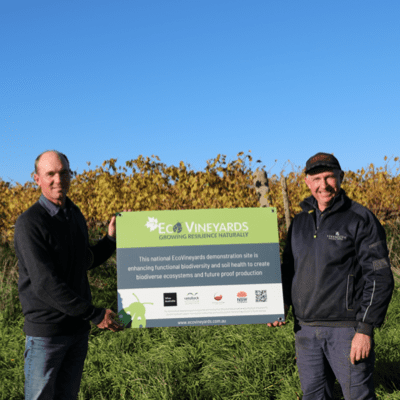Tell us in a few sentences about your experience as a viticulturist, how did you arrive here?
Tamburlaine and our vineyard team have been growing grapes in Orange since the mid 90’s and in the Hunter Valley prior to that. We have had Certified Organic vineyards since 2003 and are the largest organic wine brand in Australia.
Our focus remains on continuous improvement in our organic management program, assessing sustainability benefits in soil, vine, and environmental health.
Why did you decide to apply to be an EcoGrower, was there something specific that influenced your decision and/or had you attended a previous EcoVineyards session?
Tamburlaine have a long and successful history in organics, and we see the EcoVineyards program as consistent with and complementary to our farming philosophy and our endeavours to drive continuous improvement and change.
Has there been a defining moment or catalyst for you to move towards more ecologically driven viticultural practices?
Tamburlaine has been ahead of the curve on better and more environmentally-sound farming practices. Seeing the benefits that organic viticultural practices have had on our Orange vineyards and wines, we are a natural partner in any initiative to stimulate new thinking across the industry as a whole.
Can you provide a brief overview of your project ideas, and what you wish to achieve over the 3 years and why is this important to you?
We aim to see improvement to our soil health. diversity of flowering plants and in turn insects in our vineyards. Over the three years our goal is to further lift overall biodiversity and as a result, increase the resilience of our vines.
Are you just starting to learn, or have you been enhancing biodiversity on your property and is this an extension of what you are currently doing?
We have been increasing our soil health through or organic viticulture practices and we see this program as being complementary.
Tell us about your hidden superpowers, something that others don’t know about you or a practice you would like to champion?
Organic viticulture is our focus. We have over 700 hectares of vines either certified organic or in-conversion. This is already a major organic vineyard management project in the Australian industry context. Organic management of vineyards on this scale requires careful assessment of inputs, equipment, technology, and environmental improvement. We have taken several steps in each of these areas and are looking for more input to achieve industry best practice.
Where do you see grape growing in the future, do you feel there is an urgency to change current practices? If so, why?
We see regenerative viticulture as playing a big part of the Australian wine industry in the future. Caring for and improving our soils and vineyards with the outcome of better and sustainable winemaking.
What else would you like to share with the broader EcoVineyards community, what gets you excited about the future?
We are looking forward to sharing what we have learned already and the steps we are taking to increase the functional biodiversity on our vineyards which complement our organic viticultural systems.

